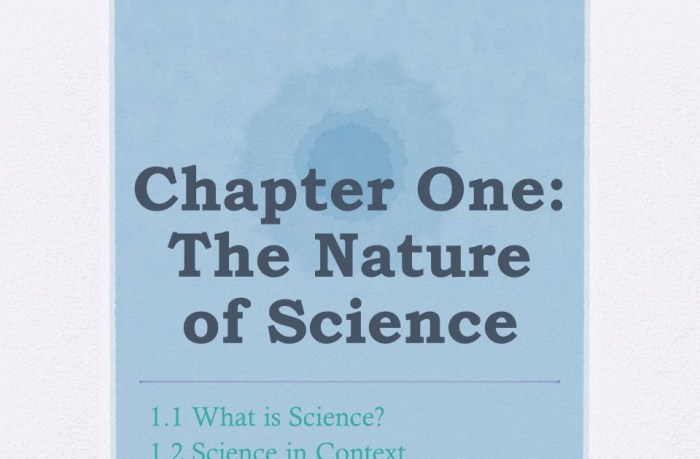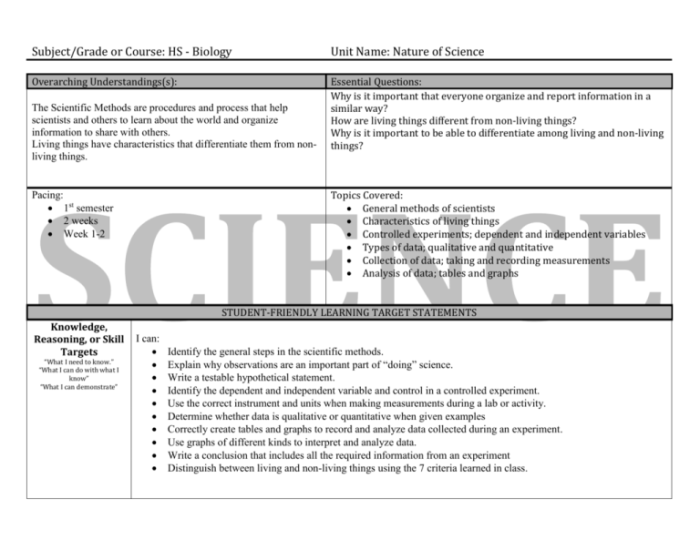At the heart of scientific exploration lies the Nature of Science Answer Key, an illuminating guide that unlocks the fundamental principles and practices that drive scientific inquiry. This comprehensive resource empowers individuals to navigate the complexities of the scientific method, unravel the nature of scientific theories, and delve into the ethical implications that shape scientific research.
Embark on an intellectual journey that unravels the intricacies of scientific discovery, bridging the gap between curiosity and understanding.
Scientific Method
The scientific method is a systematic approach to the study of natural phenomena. It involves making observations, forming hypotheses, testing hypotheses, and drawing conclusions.
The scientific method has been used to advance scientific knowledge in a wide range of fields, including physics, chemistry, biology, and medicine.
Limitations of the Scientific Method
- The scientific method can only be used to study natural phenomena.
- The scientific method is not always able to provide definitive answers.
- The scientific method can be time-consuming and expensive.
Nature of Scientific Theories
A scientific theory is a well-substantiated explanation of some aspect of the natural world that is acquired through the scientific method, and incorporates facts, laws, inferences, and tested hypotheses.
Difference Between a Scientific Theory and a Hypothesis
- A scientific theory is a well-substantiated explanation of some aspect of the natural world, while a hypothesis is a tentative explanation that has not yet been fully tested.
- Scientific theories are based on a large body of evidence, while hypotheses are based on a limited amount of evidence.
- Scientific theories are generally accepted by the scientific community, while hypotheses are not.
Role of Evidence in Supporting Scientific Theories
Evidence is essential for supporting scientific theories. Evidence can come from a variety of sources, such as experiments, observations, and data analysis.
The more evidence that supports a scientific theory, the more likely it is to be accepted by the scientific community.
Scientific Inquiry
Scientific inquiry is the process of asking questions about the natural world and seeking answers through observation, experimentation, and logical reasoning.
Types of Scientific Inquiry
- Basic researchis conducted to increase our understanding of the natural world.
- Applied researchis conducted to solve specific problems.
Importance of Asking Good Scientific Questions
Asking good scientific questions is essential for successful scientific inquiry. Good scientific questions are clear, concise, and testable.
Good scientific questions also lead to new insights and discoveries.
Role of Technology in Scientific Inquiry
Technology plays a vital role in scientific inquiry. Technology can be used to collect data, analyze data, and communicate findings.
Technology has made it possible to conduct scientific research that would not have been possible a few decades ago.
Scientific Communication: The Nature Of Science Answer Key

Scientific communication is the process of sharing scientific findings with others.
Importance of Scientific Communication
Scientific communication is important for several reasons. First, it allows scientists to share their findings with other scientists.
Second, it allows scientists to get feedback on their work.
Third, it allows the public to learn about scientific discoveries.
Different Ways Scientists Communicate Their Findings
- Scientific journalsare one of the most common ways that scientists communicate their findings.
- Scientific conferencesare another way that scientists share their findings.
- Booksand websitesare also used to communicate scientific findings.
Role of Peer Review in Scientific Communication
Peer review is a process in which scientists review each other’s work before it is published.
Peer review helps to ensure that scientific findings are accurate and reliable.
Scientific Ethics

Scientific ethics are the moral principles that govern the conduct of scientific research.
Ethical Implications of Scientific Research
Scientific research has the potential to have a significant impact on society.
It is important for scientists to consider the ethical implications of their research before they conduct it.
Importance of Responsible Conduct in Scientific Research
Responsible conduct in scientific research is essential for maintaining the integrity of the scientific process.
Scientists have a responsibility to conduct their research in a way that is honest, ethical, and respectful of others.
Examples of Scientific Misconduct
- Falsifying data
- Plagiarism
- Misrepresenting results
Science and Society
Science and society are closely intertwined.
Science has a significant impact on society, and society has a significant impact on science.
Relationship Between Science and Society
The relationship between science and society is complex and multifaceted.
On the one hand, science can be used to solve social problems and improve the quality of life.
On the other hand, science can also be used to create new problems and harm society.
Impact of Science on Society
Science has had a profound impact on society.
Science has led to the development of new technologies, new medicines, and new ways of understanding the world around us.
Science has also led to changes in our social and cultural values.
Role of Science in Addressing Societal Issues, The nature of science answer key
Science can play a vital role in addressing societal issues.
Science can be used to develop new solutions to problems such as climate change, poverty, and disease.
Science can also be used to inform public policy and decision-making.
Answers to Common Questions
What is the fundamental principle of the scientific method?
The scientific method follows a systematic approach involving observation, hypothesis formulation, experimentation, data analysis, and conclusion.
How do scientific theories differ from hypotheses?
Scientific theories are well-substantiated explanations supported by a substantial body of evidence, while hypotheses are tentative explanations that require further testing.
Why is scientific communication crucial?
Scientific communication enables the dissemination of research findings, fostering collaboration, advancing knowledge, and informing decision-making.
What are the ethical considerations in scientific research?
Scientific research must adhere to ethical principles, including responsible conduct, data integrity, and respect for human and animal subjects.
